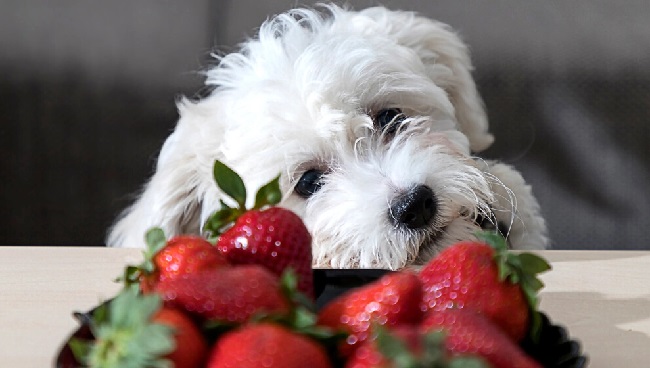As pet owners, we strive to provide our dogs with a balanced and nutritious diet. While dogs primarily thrive on a diet of high-quality dog food, incorporating fruits and vegetables can offer additional health benefits.
However, it’s important to know which fruits and vegetables are safe for dogs to consume.
In this article, we will provide a comprehensive guide to fruits and vegetables that dogs can eat, ensuring they receive essential nutrients while avoiding potentially harmful options.

Fruits and Vegetables Dogs Can Eat List
Here are some fruits and vegetables dogs can eat list
Read Also:
1. Berries
Blueberries: Rich in antioxidants, blueberries are a healthy treat for dogs. They are low in calories and high in fiber, promoting good digestion and supporting the immune system.
Strawberries: Packed with vitamins and minerals, strawberries can be given to dogs in moderation. They provide a natural source of antioxidants and can serve as a tasty, nutritious snack.
Raspberries: Raspberries are safe for dogs and contain essential nutrients like vitamin C and dietary fiber. However, they should be given in moderation due to their naturally occurring sugar content.
2. Leafy Greens
Spinach: Spinach is a nutrient-rich green vegetable that can provide various vitamins and minerals to dogs. It is best served cooked to enhance nutrient absorption and avoid any potential issues with oxalates.
Kale: Kale is another leafy green that can be added to a dog’s diet in moderation. It contains vitamins A, C, and K, as well as beneficial antioxidants.
Lettuce: Dogs can enjoy small amounts of lettuce, such as romaine or iceberg. Lettuce is low in calories and can provide hydration and fiber.
3. Other Safe Fruits and Vegetables
Carrots: Carrots are a popular choice for dog treats. They are low in calories, high in fiber, and packed with beta-carotene, which supports eye health.
Apples: Apples can be a healthy and crunchy snack for dogs. Remove the seeds and core before offering slices to your furry friend.
Pumpkin: Pumpkin is a great source of fiber and can aid in digestion for dogs. It is important to use plain, canned pumpkin without any added sugars or spices.
4. Important Considerations
Moderation: While fruits and vegetables offer nutritional benefits, they should be given in moderation as part of a balanced diet. Too much of any food, including fruits and vegetables, can cause digestive upset.
Safe Preparation: Wash all fruits and vegetables thoroughly to remove any pesticides or dirt. Remove seeds, cores, and any inedible parts before feeding them to your dog.
Allergies and Sensitivities: Every dog is unique, and some may have specific allergies or sensitivities to certain fruits or vegetables. Monitor your dog’s reactions and consult with a veterinarian if you have any concerns.
Read Also:
Conclusion
Incorporating safe and nutritious fruits and vegetables into your dog’s diet can provide additional health benefits and variety. Remember to introduce new foods gradually and monitor your dog’s response.
When in doubt, consult with your veterinarian to ensure that the fruits and vegetables you offer are suitable for your dog’s specific dietary needs.
By offering a variety of fruits and vegetables from the safe list, you can contribute to your dog’s overall health and well-being.
























